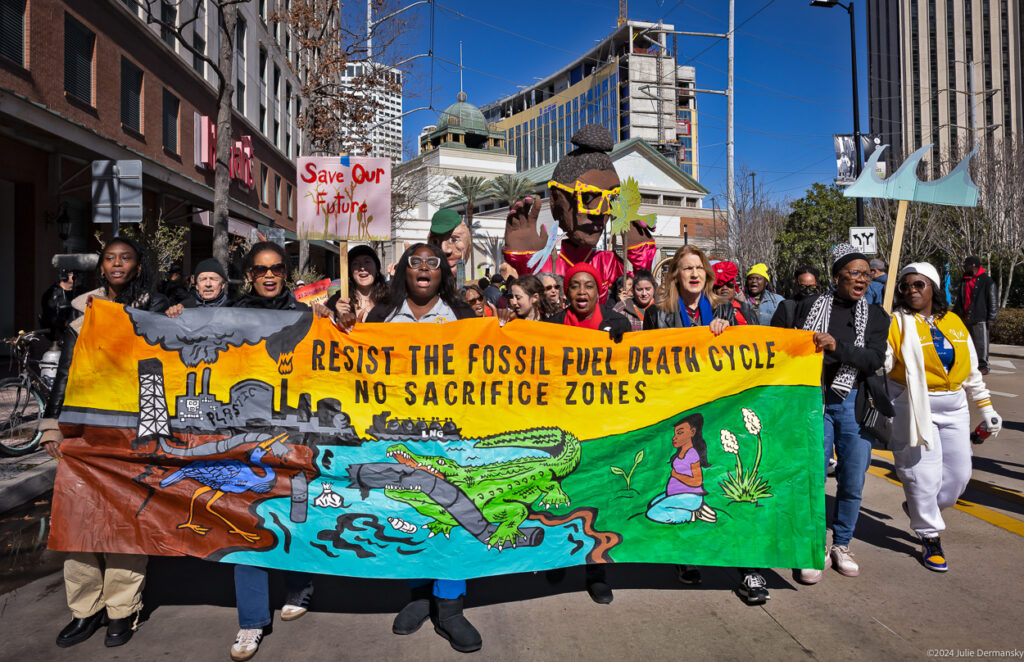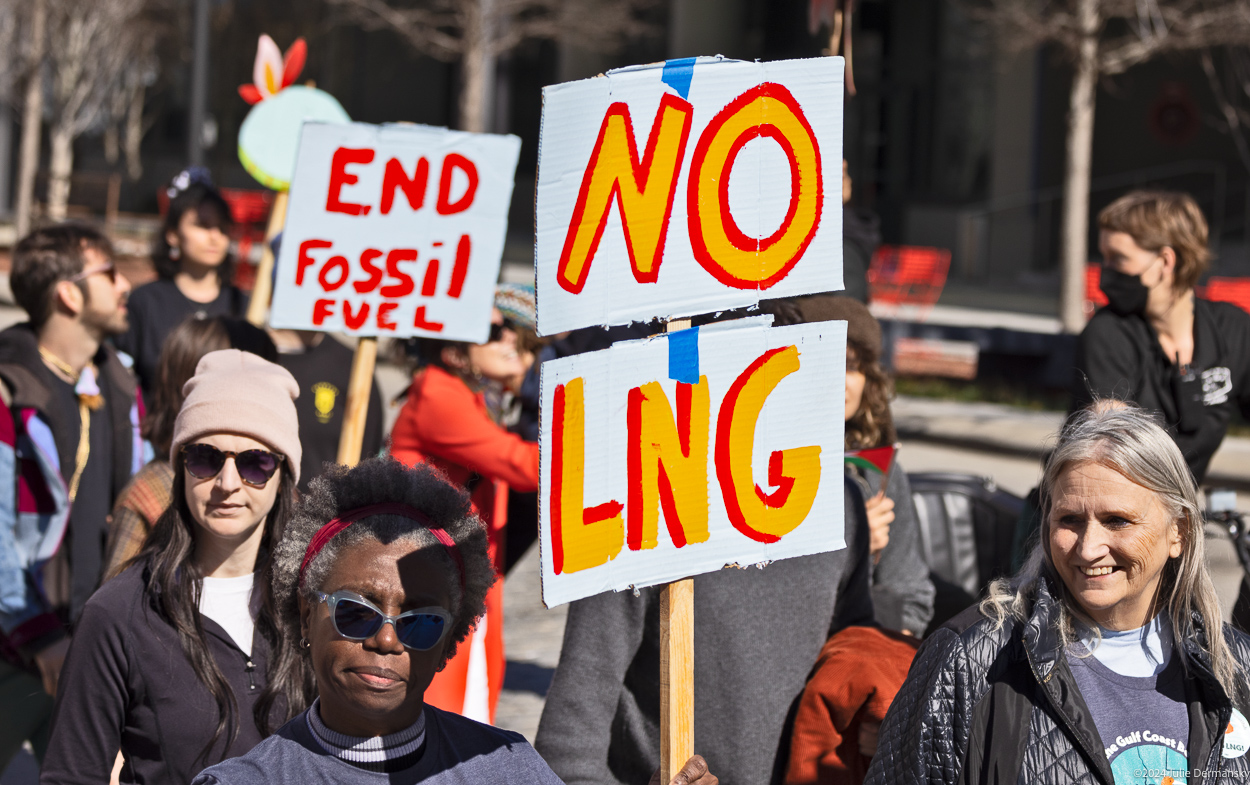On a frigid but sunny Tuesday afternoon outside New Orleans’ Ernest N. Morial Convention Center, a small but dedicated group of environmental activists affiliated with Sunrise Movement New Orleans protested the start of the 20th edition of the Americas Energy Summit & Exhibition.
The conference was originally scheduled for the end of October of 2023. But it was canceled without explanation by conference organizers several weeks before it was due to begin. The event aims to bring together policymakers and liquified natural gas (LNG), natural gas, and hydrogen players to explore new avenues for fossil fuel expansion.
“We’re out here today in resistance and opposition, to let them know that they’re not welcome here in New Orleans, in the state that they’re destroying,” said Sage Franz, a member of the local Sunrise Movement group. “They’re destroying our coastline. They’re here to scheme on how to keep doing that, and we’re here to tell them you’re not allowed to do that anymore.”
The rescheduled conference, which took place for nearly a week from January 16-19, felt like a more scaled-down event, with far fewer than the anticipated 3,000 attendees. On the first day of the convention, attendance at strategic session speeches and those of the related hydrogen conference were so low that event organizers removed unused seating.
“The people inside this conference, the execs from oil and gas, the political figures from the governments that work with these companies, they know exactly how bad what they’re doing is,” said Benjamin Hoffman, another member of the Sunrise Movement.
“They know they’re exacerbating the climate crisis. They know that they don’t have much longer to continue these sorts of projects,” Hoffman added. “So they’re just going to try and squeeze out every last bit of profit they can and give it fancy new names like carbon capture and sequestration. It’s not new.”
As the conference chair for the Americas Energy Summit gave her opening remarks Wednesday morning, Hoffman and another member of the Sunrise Movement, who didn’t wish to be identified, called attention to the back of the room.
They attempted to unfurl a banner, but it was quickly ripped from their hands. Still, Hoffman managed to get in a few words before he was kicked out of the conference. Sarcastically, he thanked the room of “polluters” for destroying Louisiana’s coastline.
“On my way out, I called them a bunch of greedy assholes,” Hoffman said. “Their little gatherings shouldn’t happen in peace. What they’re doing is violent.”

While hundreds of oil and gas developers met at the summit to talk about increasing fossil fuel production, about 50 miles down river from New Orleans Venture Global is building a massive LNG export facility in Plaquemines Parish. Another 12 LNG export terminals have been proposed in the state, despite warnings from the Intergovernmental Panel on Climate Change researchers that no new fossil fuel projects should be developed if we are to meet international pledges aimed at preventing further global warming.
LNG is the primary concern to Franz, who discussed it at length when asked what she would most like to communicate to the general public about why people are protesting the conference.
“The greenwashing term for it is liquefied natural gas. But there’s nothing natural about it,” she said. “It’s methane gas, which is 80 times more warming in the atmosphere than carbon dioxide. And currently there’s very little regulation around the monitoring of methane leaks into the atmosphere from these facilities.”
She added that “every step along the way, methane is being leaked into the atmosphere with no data on how much is being leaked, and how it’s affecting the already warming planet.”
Franz was also concerned about the oil and gas industry’s enthusiasm for carbon capture and sequestration (CCS), which the industry has argued is fundamental to their effort to become carbon neutral. “They’re putting it underground in very leaky wells, using technology that has not been proven to work and, in fact, has been very harmful in places where these wells have leaked and or pipelines have exploded,” Franz explained.
She thinks CCS and LNG production offer “false solutions.” “We should be moving in the direction of renewables,” she said. “But the oil and gas industry continues to think that we can use technology and invent our way out of this crisis.”
Though Hoffman and the unnamed Sunrise member were escorted out of the conference with little fanfare after interrupting the opening statement, their direct action resonated throughout the day. A member of the next panel after Hoffman was escorted out of the meeting, Adam Prestidge with Glenfarne Energy Transition, acknowledged the Sunrise Movement members’ concerns.
“We had the interruption a few minutes ago from the climate protester. It’s easy and somewhat tempting to ignore that and kind of move on. However, we can’t do that,” he said. “Because even if someone might be unprofessional at a conference like this the sentiments behind it are compelling and are compelling to a very large segment of the population.”
Prestidge said this is something LNG operators, investors, and developers need to “adapt to.”
Still, presenters spoke about a world in which fracked gas production is greater than it is today, tapping out the Permian Basin in Texas before moving on to the Haynesville in north Louisiana. LNG developers, like Commonwealth LNG’s Executive Chairman Paul Varello, acknowledged at the meeting that climate concerns do factor into discussions about 20-year contracts with European countries looking to replace Russian gas. Still, he said he doesn’t expect climate concerns to cut into profits anytime soon.
Commonwealth LNG aims to build a facility in south Louisiana that would start shipping LNG by 2027. “That means the contract ends in 2047, very close to what they perceive as a mandate to be carbon free by 2050,” he said. Varello added that European countries are willing to pay more for shorter contracts to avoid political scrutiny.
At the last panel discussion of the day, the protesters’ direct action was once again the subject of conversation. Keith Shoemaker of EQT Corp. said, “the protesters didn’t know what they were talking about.” Other speakers agreed the protesters needed “more education.”
Asked what they would say to the protesters if they had a chance, Martin Mayer of McDermott International Ltd. replied with a series of rhetorical questions: “How did you get here? How do you heat your home? What powers your smartphone?”
Dena Wiggins, president and CEO of the Natural Gas Supply Association and moderator of the discussion, quickly ended the open question segment of the discussion.
Subscribe to our newsletter
Stay up to date with DeSmog news and alerts







